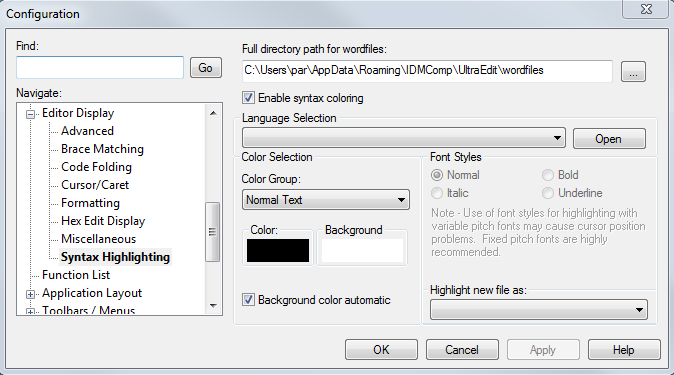Difference between revisions of "UltraEdit Colour Coding"
| (16 intermediate revisions by 7 users not shown) | |||
| Line 1: | Line 1: | ||
| − | =Introduction= | + | = Introduction = |
| − | This page describes the process for setting up TUFLOW control file colour coding. | + | |
| + | This page describes the process for setting up TUFLOW control file colour coding. The method for enabling this has changed slightly with UltraEdit versions, an releases pre version 15 used a '''wordfile.txt''', version 15 and onward use a '''TUFLOW.uew'''. The process is described for both of these methods. | ||
| + | |||
=Method= | =Method= | ||
| − | ==Current UltraEdit (.uew)== | + | ==Current UltraEdit (version 15 onwards)== |
| + | Download the UltraEdit Syntax Highlighting file from the TUFLOW website, available at [https://downloads.tuflow.com/Utilities/Syntax_Highlighting/UE_TUFLOW_Syntax_Highlighting.zip https://www.tuflow.com/Download/Miscellaneous/UE_TUFLOW_Syntax_Highlighting.UEW]. <br> | ||
| + | Save this file to the UltraEdit Wordfile Directory. The default directory varies depending on the version of UltraEdit and Username. To check where this directory is (or to change this directory) use the following menu item:<br> | ||
| + | :''Advanced >> Configuration >> Editor Display >> Syntax Highlighting''<br> | ||
| + | Once the file has been added to the directory, you may need to restart UltraEdit to see the changes.<br> | ||
| + | [[File:UE Syntax Highlighting uew.png|frame|none|UltraEdit Syntax Highlighting, set Wordfiles Directory]] | ||
| + | |||
| + | =Example= | ||
| + | Once implemented, TUFLOW control files (tcf, tgc, ecf, tbc and others) should now be colour coded like the example below: | ||
| + | [[File:UE Example ColourCoding.png|frame|none|Example Colour Coding]] | ||
| + | |||
| + | = NT Batch and DOS Syntax Highlighting = | ||
| + | If you are regularly setting up and running TUFLOW from DOS batch files, the following wordfile may also be of use to you: | ||
| + | [https://www.ultraedit.com/downloads/extras/wordfiles/ https://www.ultraedit.com/downloads/extras/wordfiles/] | ||
| − | + | It can be loaded using similar methods to that of the TUFLOW wordfile in the examples above. | |
| − | |||
| − | |||
Latest revision as of 15:13, 18 July 2024
Introduction
This page describes the process for setting up TUFLOW control file colour coding. The method for enabling this has changed slightly with UltraEdit versions, an releases pre version 15 used a wordfile.txt, version 15 and onward use a TUFLOW.uew. The process is described for both of these methods.
Method
Current UltraEdit (version 15 onwards)
Download the UltraEdit Syntax Highlighting file from the TUFLOW website, available at https://www.tuflow.com/Download/Miscellaneous/UE_TUFLOW_Syntax_Highlighting.UEW.
Save this file to the UltraEdit Wordfile Directory. The default directory varies depending on the version of UltraEdit and Username. To check where this directory is (or to change this directory) use the following menu item:
- Advanced >> Configuration >> Editor Display >> Syntax Highlighting
Once the file has been added to the directory, you may need to restart UltraEdit to see the changes.
Example
Once implemented, TUFLOW control files (tcf, tgc, ecf, tbc and others) should now be colour coded like the example below:
NT Batch and DOS Syntax Highlighting
If you are regularly setting up and running TUFLOW from DOS batch files, the following wordfile may also be of use to you: https://www.ultraedit.com/downloads/extras/wordfiles/
It can be loaded using similar methods to that of the TUFLOW wordfile in the examples above.

